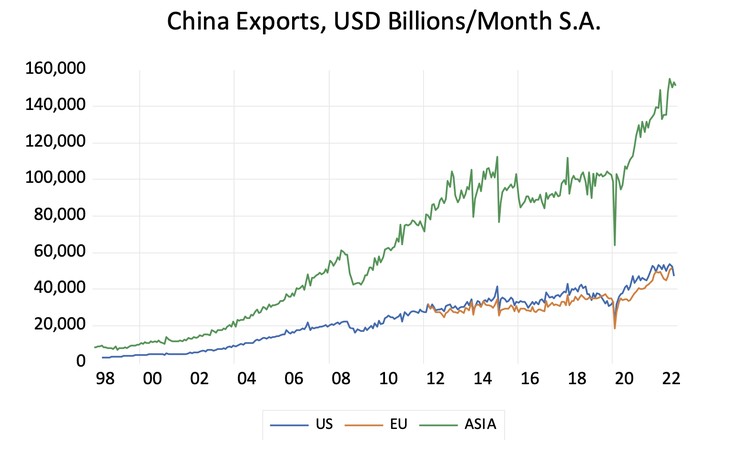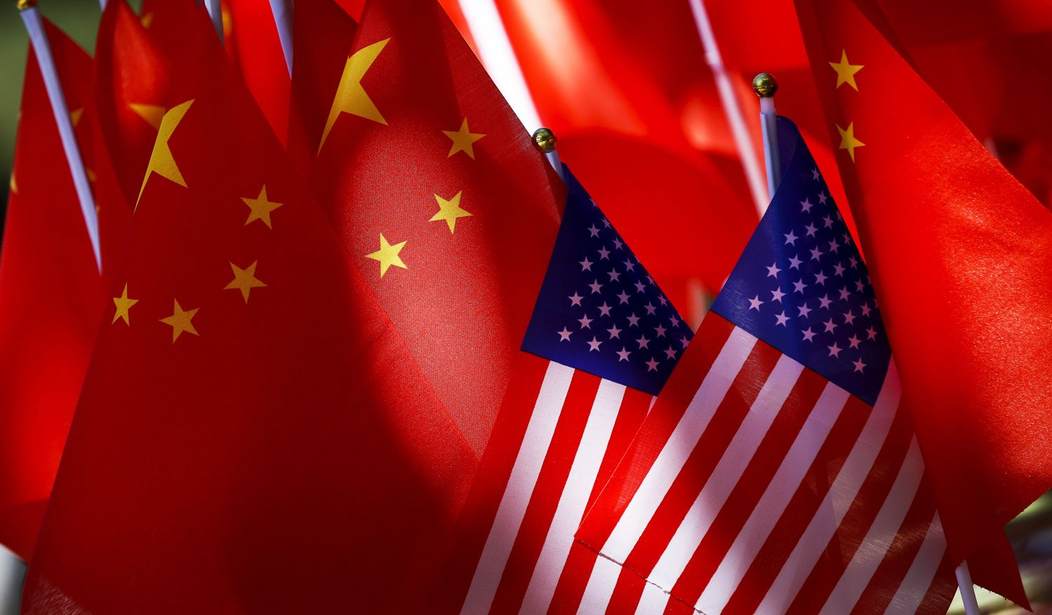Not since Chiang Kai-Shek blew up the Yellow River dikes at Zhengzhou in 1938 to slow the advancing Japanese has a major nation inflicted as much damage on itself to hurt an adversary as Washington did in its last round of high-tech export curbs on China. Millions died in the ensuing flood and famine. It didn’t help Chiang, and it won’t help the United States, where semiconductor R&D and capital expenditures will shrivel. Unmitigated panic has taken hold of American policymakers, and the outcome will not be good. Scott Foster detailed the damage to the revenues of America’s semiconductor equipment and design industries in Asia Times on Oct. 17.
For years, the U.S. establishment scoffed at China’s technological ambitions. Now it’s ready to damage America’s high-tech industry in the hope of hurting China even more. This Jekyll-to-Hyde metamorphosis of America’s elite has nothing to do with China’s military expansion, the vulnerability of Taiwan, the nasty treatment of China’s Uyghur minority, or the suppression of dissidents in Hong Kong. It’s about elite privilege and money. After the Cold War, the American elite built wealth beyond the dreams of avarice out of the digital economy that America first created to defeat the Soviet Union. Now China threatens to dominate the Fourth Industrial Revolution.
The problem isn’t that China is advancing. It’s that we’re stuck in the mud. To win the Cold War, the federal government spent about 1% of GDP on the development part of R&D, the equivalent of $320 billion a year in current dollars. That gave us computer chips, lasers, optical networks, flat displays, the Internet, and everything else that went into the modern age. The Biden Administration offers $38 billion in subsidies to chipmakers over five years. We’re off by a zero. We put our top talent into social media, not the frontier of physics.
It seems like China is the only thing that both parties agree about. Count me out of the one-upmanship in China-bashing. If we want to stay ahead of China, we need to put our own house in order. Last year I told the Chinese website Observer: “I want China to be prosperous, secure, and a step behind the United States.”
In 2020, I published You Will Be Assimilated: China’s Plan to Sino-Form the World, with horse’s mouth reporting of Chinese plans to digitize the world economy. China wants to transform manufacturing, logistics, health care, and virtually every other sector of the world economy. It already has automated ports and warehouses that make Amazon facilities look like something out of Dickens. The establishment didn’t believe what was happening before it is eyes. China could make toasters for Walmart and assemble iPhones at Foxconn sweatshops but never take leadership in high tech.
Sometime early this year, the establishment rolled out of its figurative bed, rubbed its eyes, and realized that its franchise was at risk. Now it is bouncing off its figurative ceiling.
Two years earlier the Boston Consulting Group estimated that the U.S. providers would take a 37% hit to revenues if banned from selling to China. If that sounds exaggerated, recall that the Pentagon in early 2020 intervened to stop export controls on semiconductor equipment to just one Chinese company, namely Huawei, because the damage to American firms would be devastating. The Wall Street Journal reported on Jan. 20, 2020:
The Commerce Department’s efforts to tighten the noose on Huawei Technologies Co. is facing a formidable obstacle: the Pentagon.
Commerce officials have withdrawn proposed regulations that would make it harder for U.S. companies to sell to Huawei from their overseas facilities following objections from the Defense Department as well as the Treasury Department, people familiar with the matter said.
The Pentagon is concerned that if U.S. firms can’t continue to ship to Huawei, they will lose a key source of revenue—depriving them of money for research and development needed to maintain a technological edge, the people said. The chip industry has pressed that argument in talks with government officials.
Defense Secretary Mark Esper was asked about The Wall Street Journal’s reporting on the concern during an appearance Friday at the Center for Strategic and International Studies in Washington.
“We have to be conscious of sustaining those [technology] companies’ supply chains and those innovators,” Mr. Esper said. “That’s the balance we have to strike.”
Now the Biden administration has effectively banned sales of advanced equipment and design software to all of China, and there isn’t a peep from the Pentagon or anyone else. The Semiconductor Industry Association is silent. Intel’s CEO muses that the restrictions are “inevitable.” The establishment has reached a consensus, and it will enforce party discipline with a stringency that would make Stalin cringe. The echo chamber in the press will intone, “Human rights violations, surveillance state, military threat.”
What changed? China’s Uyghurs suffered forced assimilation for years. China had built enough missiles to sink U.S. carriers within a few hundred miles of its coast by no later than 2016.
It is strange to hear this from the National Commission on Artificial Intelligence (Mid-Decade Challenges to National Competitiveness), headed by former Google CEO Eric Schmidt:
American companies, and those in allied nations, have enabled the PRC’s chip breakthroughs. The United States and its allies must take stronger actions to block Beijing’s access to advanced chips. China is powering its AI ambitions and military modernization with advanced chips designed and built by firms based in the United States and allied countries. Policymakers must keep export controls and other policies current to the technology and threat, then place the onus on firms to demonstrate that sales of cutting edge chips to the PRC do not boost Beijing’s military modernization and human rights abuses.
For the past twenty-odd years, Big Tech got rich by selling expensive software to consumers who ran it on cheap hardware from China. The cost of computer memory fell to 1 cent per megabyte in 2020 from 70 cents in 2000 thanks in large part to China’s industrial machine, supporting trillion-dollar valuations for U.S. tech giants. After the dotcom crash of 2000, U.S. high-tech companies dumped their manufacturing businesses. Huawei became the top telecom infrastructure firm because Cisco didn’t want the business. Silicon Valley built China’s semiconductor industry because it didn’t want the trouble of manufacturing anything. Cisco’s and Google’s return on equity is about 30%, while Huawei earned single digits.
Now we are shocked — shocked — to discover that China has aspirations beyond assembling iPhones and that it would like to manufacture high-end chips just like its cousins in Taiwan.
It has finally dawned on Silicon Valley that China has more data than anyone else on which to train artificial intelligence systems and that if China can match this data — the fuel of the Fourth Industrial Revolution — to a corresponding engine, it will push its erstwhile Silicon Valley sponsors out of the way and pulp their trillion-dollar franchises. The ascent of TikTok at the expense of Instagram and other American tech leviathans was a wake-up call.
China is taking over vast swaths of the world, starting with its own Asian neighborhood, with industrial power. It has gained vast influence and economic advantage by leading the expansion of Asian economies. Its exports to Asia are now four times its exports to the U.S. or the European Union respectively.

China won’t sell more goods by invading Vietnam or Indonesia. Its Belt and Road strategy, leading with digital and physical infrastructure, locks the world’s most populous countries into China’s economic orbit and allows it to shift its labor-intensive industries to cheaper venues. This brings a lot of benefits to its trading partners. What should worry us is not what China does wrong but what it does right.
For the record, I do not like China. I don’t like its imperial system of governance, which resembles no Western institution more than the Mafia. I don’t like the food, the architecture, or the literature which, sadly, I can read only in translation. I prefer Homer or Shakespeare to the Romance of Three Kingdoms, and I prefer Kant to Confucius. But it would be churlish, indeed bigoted, not to respect its accomplishments. More people have risen from poverty to prosperity in the past generation in China than in any other place or time. For this, I give China one cheer of the proverbial three.
Biden’s chip restrictions will hurt China plenty. It remains to be seen whether China will hurt us even more. Meanwhile, China graduates seven engineers each year for every one of ours, with 20 of the world’s top 50 engineering schools in the US News ranking. Eventually, China will work around our controls. We can’t prevent the Chinese from reinventing chip technology, any more than British export controls stopped the U.S. from acquiring textile technology in the 1830s. What we can do is innovate faster. And that demands some big changes.










Join the conversation as a VIP Member